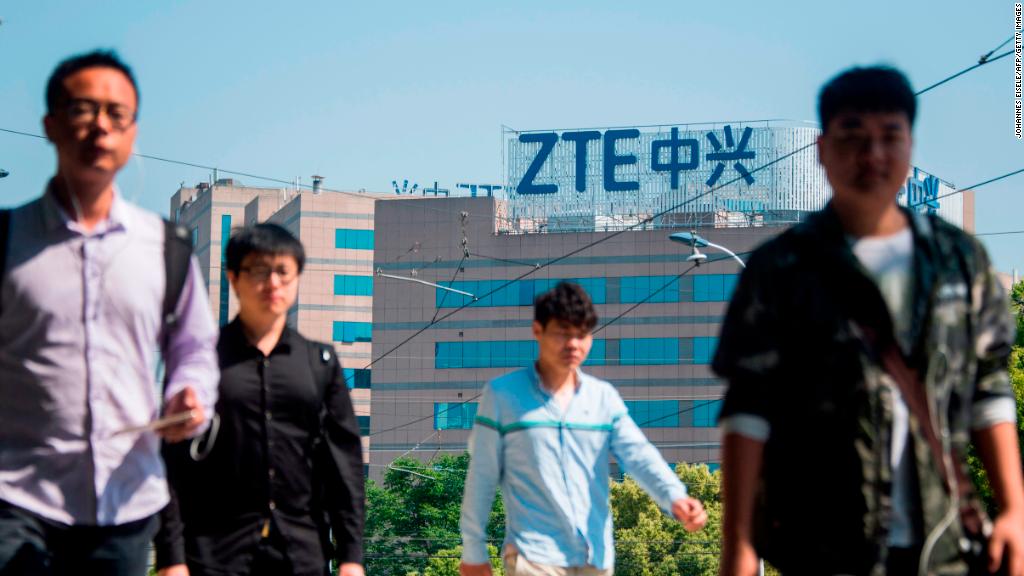Media Report

- The Washington Post reports: "Just about everything is odd about President Trump's recent tweet that he wants to help Chinese technology company ZTE "get back into business, fast" because its failure costs "too many jobs in China." It's odd that Trump, who campaigned on saving millions of U.S. jobs, suddenly says he cares about a few thousand Chinese jobs. It's odd that Trump, who championed "America First," is worried about a single Chinese firm...Trump's tweet supporting ZTE stunned many of his top advisers, who were busy preparing for another round of intense negotiations with China. Going after China was an issue there was a lot of unity about — in Washington and beyond. While few wanted a harmful trade war, there was widespread agreement that China has been stealing U.S. intellectual property and not been playing fairly on trade, and Trump appeared to be getting further than past presidents at changing that."
- Bloomberg reports: "Some of Asia's biggest infrastructure investors are seeing plenty of opportunities in India. In China's mammoth Belt-and-Road initiative, however, not so much. India is a key market for Macquarie Group thanks to strong economic growth and state asset sales... Hence its recent purchase of nine toll-roads with charges indexed to inflation. China's Belt-and-Road, however is more driven by geopolitics than investment returns... President Xi's vision, first proposed in 2013 and now enshrined in the Communist Party's constitution, involves spending as much as $1.2 trillion on railways, roads, ports and power grids over the next decade, according to Morgan Stanley. The intent is to open new business opportunities for domestic companies and extend China's reach -- even though the route cuts through multiple conflict zones and some of the world's most corrupt countries."
- CNN reports: "Taiwan is calling out global brands that have bowed to Chinese pressure to treat it as just another part of China. Taiwan's Foreign Ministry on Wednesday berated Air Canada (ACDVF) and Gap (GPS) on Twitter, accusing the airline of buckling under pressure and the clothing retailer of sending the wrong message to the world. The public scoldings follow recent efforts by the Chinese government to get international companies to adopt its stance on Taiwan on their websites and apps."
Calendar
- 2018-05-15 Trump, China, ZTE and the art of the deal
- 2018-05-14 Trump throws ZTE curveball as big week for US-China trade begins
- 2018-05-13 Trump orders U-turn over sanctions against Chinese telecom group
- 2018-05-11 How China is working hard to be less reliant on US farmers
- 2018-05-10 China Draws Up a Shopping List of American Goods to Avoid Trade War
- 2018-05-09 China is the big wild card in Trump's Iran decision
- 2018-05-08 Kim’s Second Surprise Visit to China Heightens Diplomatic Drama
- 2018-05-07 China's trade imbalance with U.S. a long-term problem, says central bank governor
- 2018-05-06 Trump may have no Plan B on trade
- 2018-05-04 China denies pointing powerful lasers at U.S. aircraft
News
- The Washington Post Just about everything is odd about Trump's support of Chinese firm ZTE
- Bloomberg Look to India for Returns, Not China's Belt-and-Road, Funds Say
- CNN Taiwan slams global brands for siding with China
- Reuters Iran asks Chinese oil buyers to maintain imports after U.S. sanctions - sources
- The New York Times Trump Indonesia Real Estate Project Gets Chinese Government Ally
- CNN Trump talks trade with China as project linked to his company gets Chinese business
- Bloomberg China's Holdings of U.S. Treasuries Rise to Five-Month High
- CNN China using 'debtbook diplomacy' to spread its strategic aims in Asia Pacific
- CNBC Trump's sanctions on Iran may be creating an oil trading boom — in China
- Bloomberg China's Holdings of U.S. Treasuries Rise to Five-Month High
- The New York Times A Chinese Town's Deep Bonds With Japan Bring Wealth and Hatred
- CNN China is getting nearly 3,000 new Starbucks
Commentary
- Foreign Policy On China's New Silk Road, Democracy Pays A Toll
- The National Interest How China Plans to Win a War Against the Navy: Sink Its Aircraft Carriers
- Brookings Trump's hot-cold stance on China
- Forbes Once A Stock Market Darling, BYD Now Bears Brunt Of China's Changing Electric Vehicle Regulations
- Politico Trump denies he's been too generous with China in trade talks
- NPR As U.S.-China Trade Talks Begin, ZTE Is In The Spotlight
- Tech Crunch China's Didi pares back 'hitchhiking' car service following passenger murder